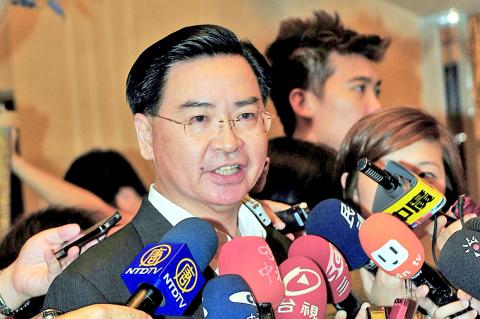Premier Jiang Yi-huah (江宜樺) is still hoping for a change of heart from opposition leaders on the upcoming national affairs conference on economics and trade, Executive Yuan spokesperson Sun Lih-chyun (孫立群) said yesterday.
The Executive Yuan has tried to contact the Democratic Progressive Party (DPP) and the Taiwan Solidarity Union (TSU) over possible meetings between Jiang and DPP Chairperson Tsai Ing-wen (蔡英文) and TSU Chairman Huang Kun-huei (黃昆輝), to persuade them to attend the conference.
“We have the greatest sincerity in wanting to have DPP and TSU members present because the issues up for discussion at the conference are of concern to the future of Taiwan’s economic development,” Sun said.

Photo: Liao Yao-tung, Taipei Times
The DPP and the TSU have already turned down invitations to participate in the conference scheduled to take place in Taipei from July 26 to July 28.
DPP Secretary-General Joseph Wu (吳釗燮) yesterday said in Greater Taichung that Executive Yuan Secretary-General Lee Shu-chuan (李四川) relayed the premier’s invitation in a telephone call, before indirectly reaffirming the party’s boycott of the conference.
“The DPP Central Standing Committee’s resolution to not attend the conference remains unchanged,” Wu said on the sidelines of a DPP’s policy meeting.
Adding that the conference would take place after the extra legislative session, which begins on Friday, Wu said major issues such as the cross-strait service trade agreement and the free economic pilot zones (FEPZ) might already be settled in the legislature by the time the meeting begins, making the conference meaningless.
Wu said President Ma Ying-jeou’s (馬英九) administration is “making every opportunity of meeting with the DPP a publicity stunt” by leaking the information to the media before initiating contact.
“This time was no different. That was why we think it was not a sincere invitation,” Wu said.
The TSU said that it had declined an invitation from the Executive Yuan and would not send delegates to the conference.
The Ma administration should have suspended the FEPZ project and legislative screening of the service trade pact until a consensus is reached in the national affairs conference for economics and trade, TSU Secretary-General Lin Chih-chia (林志嘉) said.
Ma is playing a two-handed strategy by organizing the conference to listen to public opinions, while ordering the KMT caucus to push through his agenda at all costs, Lin added.
Meanwhile, the People First Party issued a statement reiterating its position that it would not send anyone to the conference because it did not expect that the main issues confronting Taiwan could be resolved there.
The issues are conflicts between political parties and generations, of ethics, the rich and the poor, the north and the south, and management and employees, “all of political nature,” FPF spokesperson Wu Koon-yu (吳昆玉) said.
Wu Koon-yu said that the government would not be able to rebuild public confidence in its capability to address all the issues by holding the conference.
According to the Executive Yuan, the purpose of the conference is to discuss strategies to upgrade industrial development, assist young people to grasp opportunities of globalization, buffer negative effects of globalization on inequalities, boost the development of local industries and social enterprises, develop cross-strait relations, and take part in international economic integration.

SECURITY: As China is ‘reshaping’ Hong Kong’s population, Taiwan must raise the eligibility threshold for applications from Hong Kongers, Chiu Chui-cheng said When Hong Kong and Macau citizens apply for residency in Taiwan, it would be under a new category that includes a “national security observation period,” Mainland Affairs Council (MAC) Minister Chiu Chui-cheng (邱垂正) said yesterday. President William Lai (賴清德) on March 13 announced 17 strategies to counter China’s aggression toward Taiwan, including incorporating national security considerations into the review process for residency applications from Hong Kong and Macau citizens. The situation in Hong Kong is constantly changing, Chiu said to media yesterday on the sidelines of the Taipei Technology Run hosted by the Taipei Neihu Technology Park Development Association. With

CARROT AND STICK: While unrelenting in its military threats, China attracted nearly 40,000 Taiwanese to over 400 business events last year Nearly 40,000 Taiwanese last year joined industry events in China, such as conferences and trade fairs, supported by the Chinese government, a study showed yesterday, as Beijing ramps up a charm offensive toward Taipei alongside military pressure. China has long taken a carrot-and-stick approach to Taiwan, threatening it with the prospect of military action while reaching out to those it believes are amenable to Beijing’s point of view. Taiwanese security officials are wary of what they see as Beijing’s influence campaigns to sway public opinion after Taipei and Beijing gradually resumed travel links halted by the COVID-19 pandemic, but the scale of

A US Marine Corps regiment equipped with Naval Strike Missiles (NSM) is set to participate in the upcoming Balikatan 25 exercise in the Luzon Strait, marking the system’s first-ever deployment in the Philippines. US and Philippine officials have separately confirmed that the Navy Marine Expeditionary Ship Interdiction System (NMESIS) — the mobile launch platform for the Naval Strike Missile — would take part in the joint exercise. The missiles are being deployed to “a strategic first island chain chokepoint” in the waters between Taiwan proper and the Philippines, US-based Naval News reported. “The Luzon Strait and Bashi Channel represent a critical access

Pope Francis is be laid to rest on Saturday after lying in state for three days in St Peter’s Basilica, where the faithful are expected to flock to pay their respects to history’s first Latin American pontiff. The cardinals met yesterday in the Vatican’s synod hall to chart the next steps before a conclave begins to choose Francis’ successor, as condolences poured in from around the world. According to current norms, the conclave must begin between May 5 and 10. The cardinals set the funeral for Saturday at 10am in St Peter’s Square, to be celebrated by the dean of the College